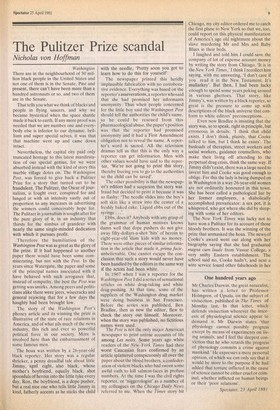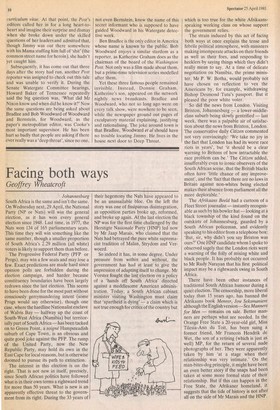The Pulitzer Prize scandal
Nicholas von Hoffman
VI'ashington There are in the neighbourhood of 30 million black people in the United States and not one of them is in the Senate. Past and present, there can't have been more than a hundred astronauts or so, and two of them are in the Senate.
That tells you what we think of blacks and people in flying saucers, and why we became hysterical when the space shuttle made it back to earth. If any more proof was needed that we are number one and everybody else is inferior to our dynamic, brilliant and super special selves, it was that that machine went up and came down intact.
Nevertheless, the capital city paid only truncated homage to this latest manifestation of our special genius, for we were absorbed instead with the kind of story this marble village dotes on. The Washington Post, was forced to give back a Pulitzer Prize for a story that turned out to be fraudulent. The Pulitzer, the Oscar of journalism, is fought over, conspired for and lunged at with an intensity vastly out of proportion to any increases in advertising the winners could conceivably hope for. The Pulitzer in journalism is sought after for the pure glory of it, in an industry that thirsts for the nimbus of grandeur with nearly the same single-minded dedication with which it pursues profit.
Therefore the humiliation of the Washington Post was as great as the glory of the prize. If it had happened to another paper there would have been some commiserating, but not with the Post. In the years since Watergate, the paper and some of the principal names associated with it have behaved with such arrogance that, instead of sympathy, the best the Post was getting was smirks. Among peers and politicians alike there were jeers, wisecracks and general rejoicing that for a few days the haughty had been brought low.
The story of the Washington Post's phoney article and its winning the prize is illustrative of the state of race relations in America, and of what ails much of the news industry, this rich and ever so powerful political force in our society. More is involved here than the embarrassment of some famous men.
The hoax was written by a 26-year-old black reporter. Her story was a regular shrieker, a penny dreadful tale about little Jimmy, aged eight, also black, whose mother's boyfriend, equally black, shot spoonfuls of heroin into the little tyke every day. Ron, the boyfriend, is a dope pusher, but a real nice one who tells little Jimmy in kind, fatherly accents as he sticks the child with the needle, 'Pretty soon you got to learn how to do this for yourself'.
The newspaper printed this luridly implausible fabrication with no corroborative evidence. Everything was based on the reporter's asseverations ,a reporter whosaid that she had promised her informants anonymity. Thus when people concerned for the little boy said the Washington Post should tell the authorities the child's name, so he could be rescued from this pharmacological abuse, the paper's position was that the reporter had promised anonymity and it had a First Amendment obligation not to reveal the name. A reporter's word is sacred. All the television dramas tell us that this is the only way a reporter can get information. Men with other values would have said to the reporter, 'We're not going to print this story, thereby freeing you to go to the authorities so the child can be saved'.
The other possibility is that the newspaper's editors had a suspicion the story was fraud but decided to print it because it was so flashy: 'The needle slides into the boy's soft skin like a straw. into the center of a freshly baked cake. Liquid ebbs out of the syringe Ebbs, does it? Anybody with any grasp of the grammar of human motives knows damn well that dope pushers do not give away fifty-dollars-a-shot 'hits' of heroin to eight-year-old *Slum kids with no money. There were other pieces of similar infOrmalion in the article that made it, prima fitcie, unbelievable. One cannot escape the conclusion that such a story would never have been handled by the editors in the same way if the actors had been white.
In 1967 when I was a reporter for the Washington Post I did a series of sensational articles on white drug-taking and white drug-pushing. At that time, some of the suppliers of the 'W'ashington drug market were doing. business in San Francisco. Before the series was published, Ben Bradlee, then as now the editor, flew to check the story out himself. Moreover, when the story was published, no fictitious names were used.
The Post is not the only major American newspaper to print untrue accounts of life among Les noirs. Some years ago white readers of the New York Times had their worst Caucasian fears confirmed by an article splattered conspicuously all over the paper about the blood brothers, a confederation of violent blacks who had sworn some awful oath to kill salmon-faces in profuse numbers. At the time I was the civil rights reporter, or 'niggerologise as a number of my colleagues on the Chicago Daily News referred to me. When the Times story hit Chicago, my city editor ordered me to catch the first plane to New York so that we, too, could report on this physical manifestation of America's age old nightmare about the slave murdering Mr and Mrs and Baby Blues in their beds.
I laughed and told him I could save the company of lot of expense account money by writing the story from Chicago. 'It is in the New York Times,' I think I recollect him saying, with me answering, don't care if you read it in the New Testament. It's mullarkey'. But then, I had been lucky enough to spend some years poking around in various ghettoes. That story, like Jimmy's, was written by a black reporter, so great is the pressure to come up with descriptions of the black universe that conform to white editors' preconceptions.
Even now Bradlee is insisting that the story was, so to speak, right in principle, but erroneous in details: 'I think that child exists. I don't think, plainly, that Cooke talked to him, but I think he exists'. The busloads of therapists, street workers and social workers, guidance counsellors, who make their living off attending to the perpetual drug crisis, think the same way. If Jimmy didn't exist, there was a large need to invent him and Cooke was good enough to oblige. For this the lady is being dumped on in Washington in a way 26-year-old women are not ordinarily honoured in this town. She has been called a pathological liar by her former employers, a diabolically accomplished prevaricator: a sex pot, it is whispered, who got where she did by sleeping with some of her editors.
The New York Times was lucky not to have won a Pulitzer for its account of those bloody brothers. It was the winning of the prize that unmasked the hoax. The news;of Cooke's award went out along with her biography saying that she had graduated magna cum laude from Vassar College, a very snifty Eastern establishment. The school said no, Cooke hadn't, and next a wire service found other falsehoods in her curriculum vitae. At that point, the Post's editors called her in for a long heart-toheart and imagine their surprise and dismay when she broke down under the skilled questions of her leaders and admitted that, though Jimmy was out there somewhere with his Mama stuffing him full of 'shit' (the common street name for heroin), she hadn't yet caught him.
Subsequently, it has come out that three days after the story had run, another Post reporter was assigned to check out this tale and was unable to verify it. During the Senate Watergate Committee hearings, Howard Baker of Tennessee repeatedly said the big question was, 'What did Mr Nixon know and when did he know it?' Now the same questions are being asked about Bradlee and Bob Woodward of Woodward and Bernstein, for Woodward, as the paper's metropolitan editor, was Cooke's most important supervisor. He has been hurt so badly that people are asking if there ever really was a 'deep throat', since no one, not even Bernstein, knew the name of this secret informant who is supposed to have guided Woodward in his Watergate detective work.
Ben Bradlee is the only editor in America whose name is known to the public. Bob Woodward enjoys a similar stardom as a reporter, as Katherine Graham does as the chairman of the board of the Washington Post. Not only was a film made about them, but a prime-tinle television series modelled after them.
Yet these three famous people remained invisible. Instead, Donnie Graham, Katherine's son, appeared on the network nightly news broadcasts. Bradlee and Woodward, who not so long ago were on every talk show, were nowhere to be seen, while the newspaper ground out pages of exculpatory material explaining, justifying and rationalising. The joke around town is that Bradlee, Woodward et al should have no trouble locating Jimmy. He lives in the house next door to Deep Throat.



































 Previous page
Previous page